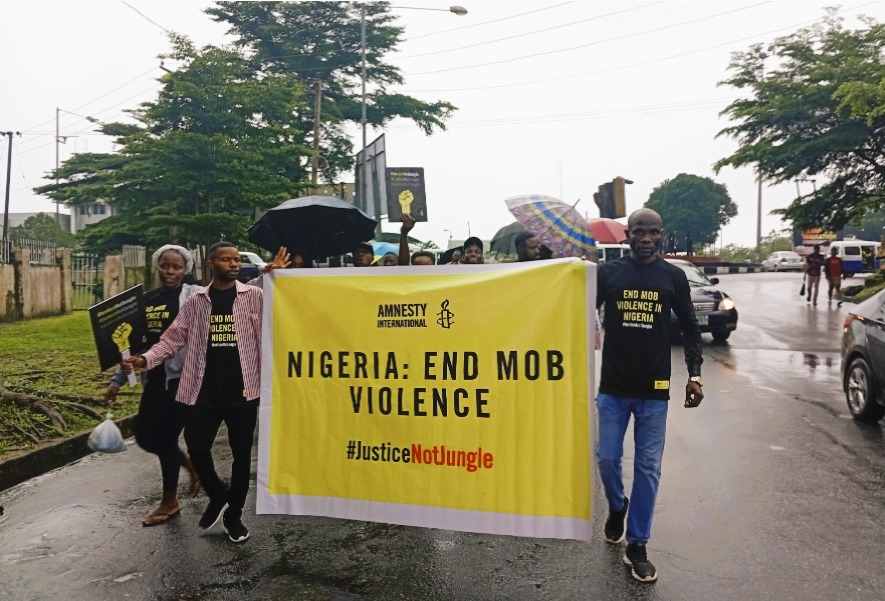The gruesome killing of 16 men by an angry mob as they traveled through the city of Uromi in southern Nigeria has brought the problem of what’s called “jungle justice” into greater focus.
The men reportedly were on a long journey north for Eid al-Fitr celebrations, but a group of vigilantes accosted them, thinking that the men were kidnappers or bandits.
Their crime was traveling with homemade Dane guns, long-barreled flintlock muskets, Nigerian journalist Gbenga Aborowa said.
“Sixteen lives lost in the most horrific way possible — not after a fair trial, not after evidence was presented,” he said in an editorial on Lagos-based News Central TV on March 31. “No, they were dragged, beaten, set on fire and killed in cold blood by a crowd that took the law into their own hands and became executioners without a shred of proof.
“This is jungle justice — a sickness that has taken deep roots in our society, a practice that robs people of their rights to be heard, their rights to defend themselves, their rights to live.”
The grim scene on March 24 in Uromi, a city in central Edo State, typifies what jungle justice is: a form of mob-led extrajudicial punishment that has been prevalent across West and Central Africa. Nigerian President Bola Tinubu and human rights groups condemned the incident, and Tinubu promised to pursue the perpetrators and bring them to justice.
Suspicions of witchcraft, blasphemy or kidnapping can lead to mob justice. In many cases, petty theft, such as pickpocketing and stealing mobile phones, bicycles or motorcycles triggers violence.
In a 2024 report, Amnesty International found at least 555 documented jungle justice incidents in Nigeria between 2012 and 2024 and described the violence as escalating in brutality and scope.
“It is appalling that mob violence is gradually becoming the norm, often meted out in crowded areas, such as motor parks, market areas and busy roads,” Amnesty International Nigeria director Isa Sanusi said in a statement. “Victims were always tortured including by beating, stoning or via the use of improvised weapons like sticks and metal rods.”
The responsibility to change lies with people, police and government justice systems, said Barbara Magaji, a program manager for Amnesty International Nigeria, during a march to end mob violence held on August 8 in Calabar, the capital of Cross River State.
“We call on Nigerians not to take laws into their hands,” she said, according to the Daily Post newspaper. “When ugly or provoking situations arise, they should report to the police.
“We call on the police and justice agencies to act rightly, because there appears to be a mistrust by the public which [is the] reason they tend to hesitate to report cases. The magistrates and lawyers should give ears to such complaints and reports, ensuring that cases are swiftly determined. This way the people can trust the system.”
Amnesty International noted that Nigeria’s police force numbers fewer than 400,000 personnel serving more than 200 million people. It advised the government to enact anti-mob violence laws, ensure swift and effective implementation of laws, and provide protection against religious violence.
Fukky Danladi Mashat, a legal practitioner in Abuja, said the government can diminish mob violence with “faster and more efficient prosecution of criminal cases, grassroots education on the dangers of jungle justice, strengthening accountability within law enforcement and [the] judiciary, and prioritizing swift and transparent justice.”
“By addressing these root causes, we can restore public trust, break the cycle of vigilante violence, and ensure true justice prevails,” she told Global Voices website.
Nigerian journalists also are acknowledging the role that the media can play in naming and shaming perpetrators of mob violence. But Aborowa’s impassioned plea to his fellow Nigerians included a warning of how jungle justice can spiral into lawless chaos:
“We must strengthen our justice system, renew trust in law enforcement and hold those responsible for jungle justice accountable, because if we don’t stop this now, the fires of mob violence will continue to burn, consuming not just the accused but the very fabric of our society.”

